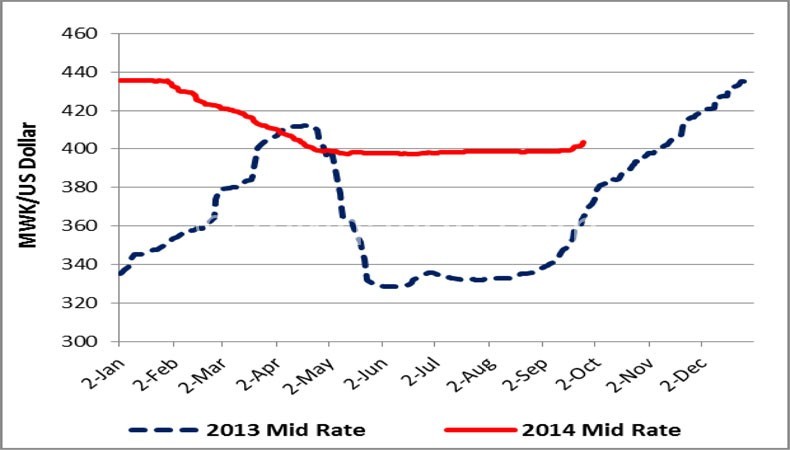Kwacha in steady decline
 While the kwacha has been in fairly steady decline over the past week and foreign exchange reserves dwindling, forex market dealers say the situation is not a desperate case.
While the kwacha has been in fairly steady decline over the past week and foreign exchange reserves dwindling, forex market dealers say the situation is not a desperate case.
The easing of the local unit and the dropping of forex reserves is not unique as it follows the nature of the market which is seasonal, according to Financial Market Dealers Association (Fimda), experts in foreign exchange trading.
The kwacha has shed some few percentage points since the marketing season for tobacco—Malawi’s principal foreign exchange earner—closed two weeks ago and is trading at around K425 to a dollar, the world’s reserve currency.
At the same time, gross official foreign exchange reserves—held by the Reserve Bank of Malawi (RBM) to prop up the kwacha—went down to $466.79 million this week, an equivalent of 2.44 months of import cover from the previous week’s $472.25 million, representing 2.47 months of import cover, according to Reserve Bank of Malawi (RBM) financial market development report of September 24.
The report also shows that private sector reserves—authorised dealer banks (ADBs) own position plus those held in foreign currency denominated accounts (FCDAS) have decreased to $292.54 million, representing 1.62 months of import covers from the previous week’s $296.59 million, 1.55 months of import cover, reflecting pressure of foreign exchange, according to analysts.
The Economist Intelligence Unit (EIU) recently said the kwacha is expected to average K422 to a dollar this year, an estimate Fimda agrees with.
Fimda president Alfred Nhlema told Business News yesterday the market is settling current import bills and that the situation is manageable.
“We are not sitting on import bills arrears and given both market and non-market (moral suasion) interventionist measures, the authorities should be able to manage the fluctuations,” he said.
“We can’t, however, run away from the fact that due to seasonality factors which are quite structural in nature, the country will experience a notable depreciation between now and February next year as has been the case before.”
RBM has, over the past months, been purchasing forex from the private sector to stabilise the currency movement and to maintain the gross official reserves close to the recommended three month import cover, an equivalent of $573 million. The import cover calculating figure is now at $191 million
Malawi, an agro-based economy, experiences seasonality in the foreign exchange market, and the depreciation of the currency follows the seasonal nature of the market.
The period between September and March is a lean supply period largely due to the closure of the tobacco sales and is characterised by heavy importation of agricultural inputs such as fertiliser which tend to inflate the import bill.
Nhlema, however, said Malawi has not yet smoothened its structural path of forex supply generation and this tend to drive the seasonality nature of the foreign exchange market.
“Efforts and policies to move away from a predominantly importing country to a predominantly exporting country should be given utmost priority so that we move away from these seasonal problems. We also need to quickly put our relationship with the donors back on track so that the donor inflows add to the existing reserves,” he suggested.
Investment advisory firm Nico Asset Managers said the risks on the currency will largely come from uncertainty on donor funds, who traditionally contribute 40 percent of the budget but have withheld it due to concerns over Cashgate—the looting of public funds at Capital Hill, the seat of government.





